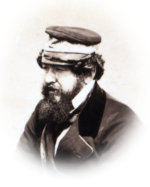May 28th.—On dropping in at the Consulate to-day, I found the skippers of several English vessels who are anxious to clear out, lest they be detained by the Federal cruisers. The United States steam frigates Brooklyn and Niagara have been for some days past blockading Pass á l’outre. One citizen made a remarkable proposition to Mr. Mure. He came in to borrow an ensign of the Royal Yacht Squadron for the purpose, he said, of hoisting it on board his yacht, and running down to have a look at the Yankee ships. Mr. Mure had no flag to lend; whereupon he asked for a description by which he could get one made. On being applied to, I asked “whether the gentleman was a member of the Squadron?” “Oh, no,” said he, “but my yacht was built in England, and I wrote over some time ago to say I would join the squadron.” I ventured to tell him that it by no means followed he was a member, and that if he went out with the flag and could not show by his papers he had a right to carry it, the yacht would be seized. However, he was quite satisfied that he had an English yacht, and a right to hoist an English flag, and went off to an outfitter’s to order a facsimile of the Squadron ensign, and subsequently cruised among the blockading vessels.
We hear Mr. Ewell was attacked by an Union mob in Tennessee, his luggage was broken open and plundered, and he narrowly escaped personal injury. Per contra, “charges of abolitionism” continue to multiply here, and are almost as numerous as the coroner’s inquests, not to speak of the difficulties which sometimes attain the magnitude of murder.
I dined with a large party at the Lake, who had invited me as their guest, among whom were Mr. Slidell, Governor Hebert, Mr. Hunt, Mr. Norton, Mr. Fellows, and others. I observed in New York that every man had his own solution of the cause of the present difficulty, and contradicted plumply his neighbor the moment he attempted to propound his own theory. Here I found every one agreed as to the righteousness of the quarrel, but all differed as to the best mode of action for the South to pursue. Nor was there any approach to unanimity as the evening waxed older. Incidentally we had wild tales of Southern life, some good songs, curiously intermingled with political discussions, and what the Northerns call hyphileutin talk.
When I was in the Consulate to-day, a tall and well-dressed, but not very prepossessing-looking man, entered to speak to Mr. Mure on business, and was introduced to me at his own request. His name was mentioned incidentally to-night, and I heard a passage in his life not of an agreeable character, to say the least of it. A good many years ago there was a ball at New Orleans, at which this gentleman was present; he paid particular attention to a lady who, however, preferred the society of one of the company, and in the course of the evening an altercation occurred respecting an engagement to dance, in which violent language was exchanged, and a push or blow given by the favored partner to his rival, who left the room, and, as it is stated, proceeded to a cutler’s shop, where he procured a powerful dagger-knife. Armed with this, he returned, and sent in a message to the gentleman with whom he had quarreled. Suspecting nothing, the latter came into the antechamber, the assassin rushed upon him, stabbed him to the heart, and left him weltering in his blood. Another version of the story was, that he waited for his victim till he came into the cloak-room, and struck him as he was in the act of putting on his overcoat. After a long delay, the criminal was tried. The defence put forward on his behalf was that he had seized a knife in the heat of the moment when the quarrel took place, and had slain his adversary in a moment of passion; but evidence, as I understand, went strongly to prove that a considerable interval elapsed between the time of the dispute and the commission of the murder. The prisoner had the assistance of able and ingenious counsel; he was acquitted. His acquittal was mainly due to the judicious disposition of a large sum of money; each juror, when he retired to dinner previous to consulting over the verdict, was enabled to find the sum of 1000 dollars under his plate; nor was it clear that the judge and sheriff had not participated in the bounty; in fact, I heard a dispute as to the exact amount which it is supposed the murderer had to pay. He now occupies, under the Confederate Government, the post at New Orleans which he lately held as representative of the Government of the United States.
After dinner I went in company of some of my hosts to the Boston Club, which has, I need not say, no connection with the city of that name. More fires, the tocsin sounding, and so to bed.
